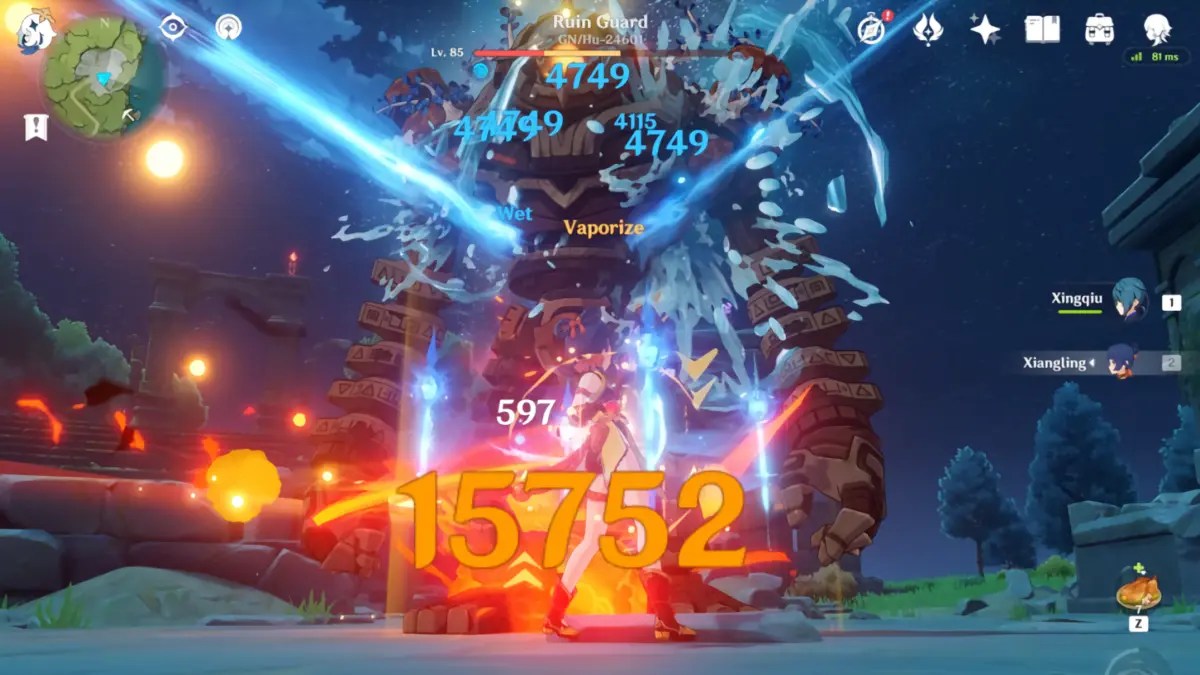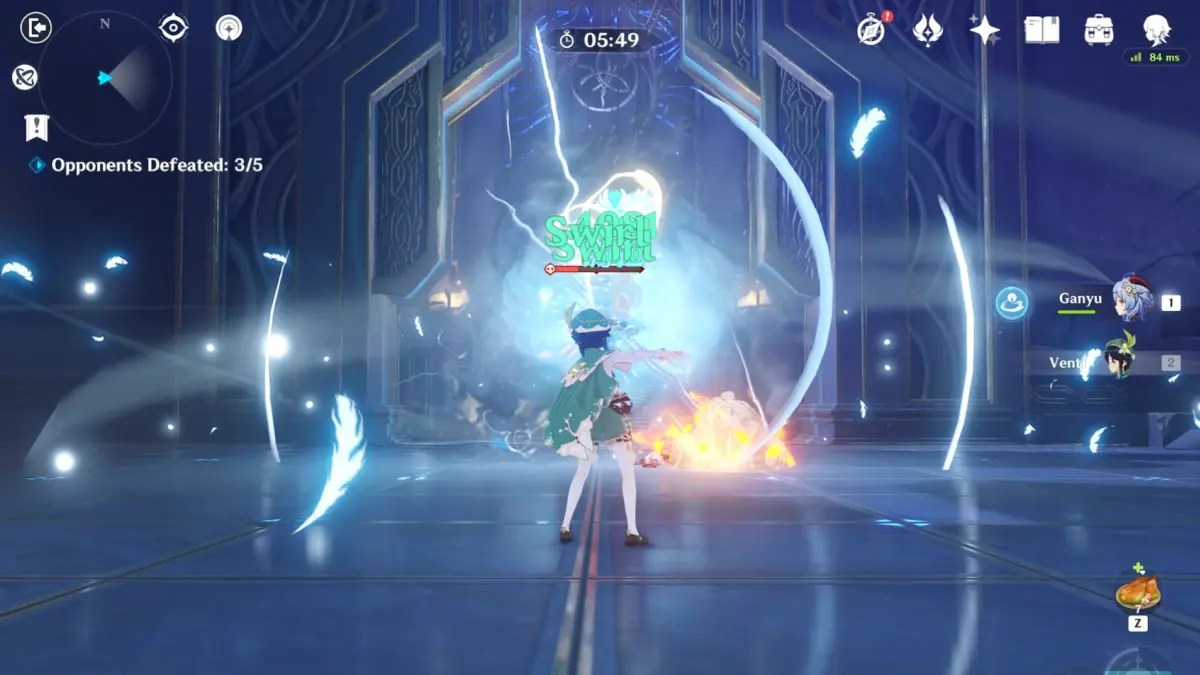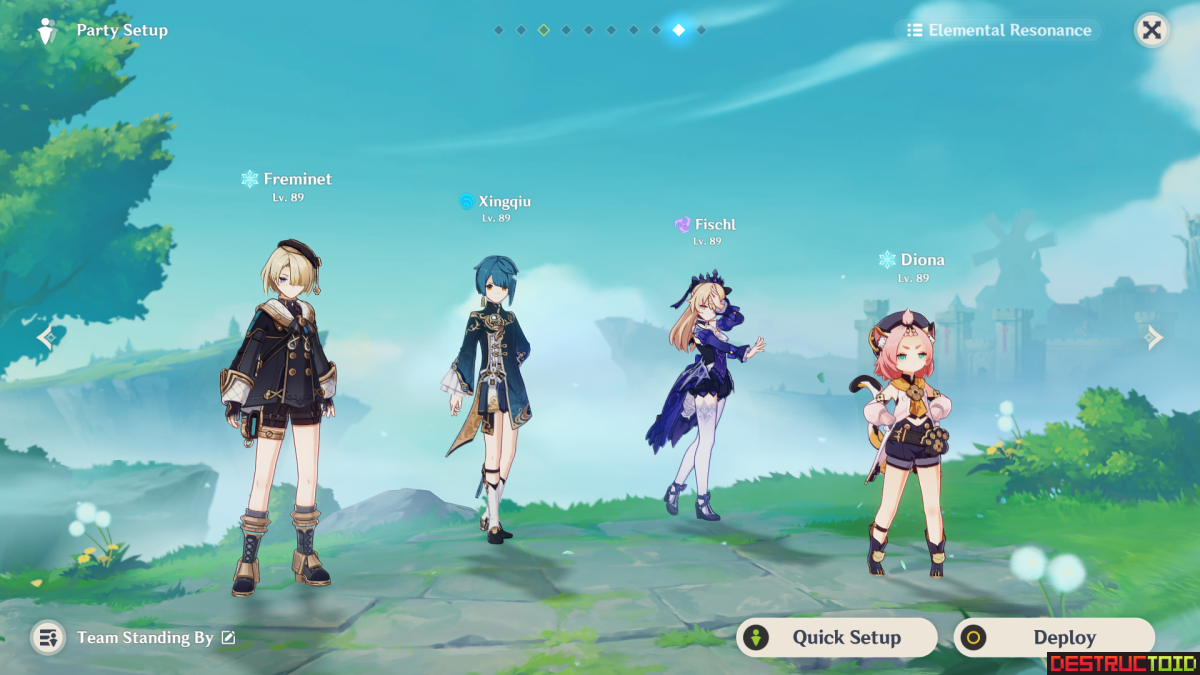Combat in Genshin Impact is all about elemental reactions. While you can just mash elements together and see what happens, controlling your reactions is key to completing harder content, like the Spiral Abyss or boss rush events.
Below is a breakdown of all of the basic, non-Dendro reactions in Genshin Impact. Dendro reactions (Burning, Bloom, Hyperbloom, Burgeon, Quicken, Spread, and Aggravate) are covered separately in our guide to Dendro elemental reactions.
Aura vs Trigger elemental reactions in Genshin Impact
All reactions are a combination of two or more elements, but the order is important. You’ll chain these together through thoughtful party compositions, making your team picks more important for endgame activities.
In Genshin Impact, hitting an enemy with an element applies an aura of that element. If you follow up with another hit using a different element, that second hit is the trigger for the resulting reaction.
For example, Xingqiu can hit an enemy with his Rain Swords to apply a Hydro aura, indicated by a Hydro icon near the enemy health bar. Xiangling can then apply Pyro with her Pyronado, triggering Vaporize.

It’s important to differentiate your auras and triggers because only the triggering character’s Elemental Mastery stat matters. If you have a character who is only ever an aura (like Xingqiu), you don’t need to build Elemental Mastery on them. For further reading on how to control who triggers your reactions, see our guide to internal cooldown in Genshin Impact.
Transformative Reactions in Genshin Impact
Transformative reactions in Genshin Impact scale only with the triggering character’s level and Elemental Mastery stat. Transformative reactions cannot CRIT. ATK and CRIT stats do not matter for reaction damage.
How to trigger Swirl: Pyro/Hydro/Electro/Cryo + Anemo
Swirl is triggered by applying Anemo to an enemy with a Pyro, Hydro, Electro, or Cryo aura. It deals damage in a small AoE around the entity it was triggered on, whether it’s yourself or an enemy. Swirl is great for spreading elements around.
With Swirl, the Anemo character is always the trigger. If Swirl is a significant source of damage in your team, your Anemo character should be level 90 with as much Elemental Mastery as possible.

How to trigger Crystallize: Pyro/Hydro/Electro/Cryo + Geo
Like Swirl, Crystallize is triggered by applying Geo to an enemy with a Pyro, Hydro, Electro, or Cryo aura. Crystallize creates a small shield around your active character.
The strength of this shield depends on your Geo character’s level and Elemental Mastery stat. Since Geo characters never build Elemental Mastery, these shields tend to be quite weak.
How to trigger Electro-Charged: Hydro + Electro
Combining Hydro and Electro triggers Electro-Charged, which deals damage over time. These ticks of damage can also chain to nearby enemies affected by Hydro.
Electro-Charged can be triggered by either Hydro or Electro, and the resulting damage will scale with the triggering character’s level and Elemental Mastery. The damage isn’t terrible, but it’s generally not worth building Elemental Mastery for Electro-Charged teams. You should just build ATK and CRIT and treat Electro-Charged as a nice bonus.
How to trigger Superconduct: Electro + Cryo
Superconduct is triggered by combining Electro and Cryo in any order. It deals a bit of damage on its own, but Superconduct is primarily used to lower enemies’ Physical RES for 12 seconds.
Physical teams rarely care about Superconduct damage, so there’s no need to go out of your way to build Elemental Mastery on your team. Just focus on ATK and CRIT for your Physical DPS character.

Amplifying Reactions for buffed party damage
Amplifying reactions in Genshin Impact increase the damage of the hit that triggered it. This is a multiplicative buff, and there are different multipliers based on which element triggered the reaction.
Characters who rely on Vaporize or Melt will want to build Elemental Mastery as well as CRIT stats. ATK is still valuable though, so don’t neglect your ATK stat!
How to trigger Vaporize: Pyro + Hydro
Combining Pyro and Hydro in any order yields Vaporize, amplifying the damage of the attack that triggered it.
Hydro is the trigger for Forward Vaporize, amplifying Hyro damage by 2x its normal value.
Pyro is the trigger for Reverse Vaporize, amplifying Pyro damage by 1.5x its normal value.
Even though forward Vaporize has the larger multiplier, reverse Vaporize is easier to trigger consistently. Most Vaporize teams will focus on reverse Vaporize by maintaining a Hydro aura and amplifying their Pyro DPS’ attacks.

How to trigger Melt: Pyro + Cryo
Combining Pyro and Cryo in any order results in Melt, amplifying the damage of the attack that triggered it.
Pyro is the trigger for Forward Melt. The Pyro hit will be amplified by 2x its normal value.
Cryo is the trigger for Reverse Melt. The Cryo hit will be amplified by 1.5x its normal value.
Like with Vaporize, reverse Melt is easier to trigger than forward Melt. Most Melt teams will focus on reverse Melt, keeping a Pyro aura on the enemy and triggering Melt with a Cryo DPS.













Published: Apr 17, 2024 03:45 pm